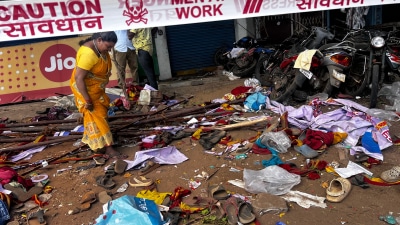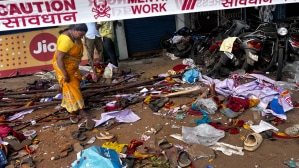Parliament saw several disruptions Thursday as the Opposition alleged that portions of dissent notes submitted by its MPs as members of the Joint Committee of Parliament (JCP) that discussed the Waqf (Amendment) Bill had been redacted, without their knowledge.

Later, the government agreed to restore some of the redacted parts, through a corrigendum to Appendix V of the JCP report. This was then tabled in the Rajya Sabha. The Lower House remained adjourned.
Story continues below this ad
Among the Opposition MPs who said that some portions still remained redacted in the revised version tabled in the Rajya Sabha was TMC member Kalyan Banerjee, who told The Indian Express: “They have restored some portions of our dissent notes, but some are still missing.”
A look at some of the redactions, which now find a place in the JCP report tabled in the House:
* One of the portions earlier redacted from AIMIM president Assadduddin Owaisi’s dissent note was about the committee’s cognisance of the “threat” to Scheduled Tribes and tribal lands allegedly due to the Waqf law.
Owaisi noted the JCP’s recommendation that the Ministry of Minority Affairs take appropriate legislative measures to forestall the declaration of tribal lands as waqf land. And said, the “Committee has failed to take into account the fact that members of Scheduled Tribes may also be Muslim and, unlike the status of Scheduled Caste, the status of an individual as a member of the Scheduled Tribe is not obliterated by such an individual professing Islam”.
Story continues below this ad
Owaisi submitted that “the freedom of a Muslim who is a member of a Scheduled Tribe to constitute a waqf simultaneously needs to be protected”.
In another section in his dissent note, which was redacted and now restored, Owaisi said it is “clear that the proposed Bill is not an exercise undertaken for the benefit of auqaf, but is an act in furtherance of a consistent political agenda of the present government to systematically undermine the rights of minorities, particularly Muslims, in this country”.
A third such section said that “the erudite arguments and detailed reasons put forward by each of these stakeholders (All India Muslim Personal Law Board, Jamiat-e-Ulema-e-Hind, Jamaat-e-Islami Hind and the Muttaheda Majilis-e-Ulama (Jammu & Kashmir) were not accepted by the Joint Committee”.
* The redacted but later restored portion of Shiv Sena (UBT) member Arvind Sawant’s dissent note quoted the manifesto of “the ruling party in Maharashtra”, noting that it said, “Action will be taken against those encroaching on Waqf Board lands, and these lands will be returned in the cases where the court has given decisions in favor of the Board”.
Story continues below this ad
Sawant submitted in his dissent note, “if this is so, the question arises as to whether this principle will be made applicable in the entire country or not”. “If yes, why this Bill?”
Sawant also questioned the JCP’s selection of whom to call as witnesses, alleging that some of them “were not at all related to or not concerned with the WAQF Board and have no stake in its functioning”. “It was only politically motivated action by the ruling party,” he wrote.
* TMC MP Kalyan Banerjee’s dissent note also saw several redactions. One of the restored portions complained that “copies of the Depositions of the Witnesses were not supplied to the Members, including us”. “The copy of the Written Reply on the queries and/or questions of the Members to the Witnesses were not supplied to the Members… The copy of the Day-to-day Minutes of the Joint Parliamentary Committee of the Meeting were not circulated,” he said.
In another bit that was earlier redacted, Banerjee said he had told the JCP chairperson (Jagdambika Pal) that insufficient time was given to the members for consideration of all the amendments approved by the committee. “(The) right of the Members to Speak on the Bill was taken away by the chairperson,” Banerjee said.
Story continues below this ad
“The Draft Report shows that the Committee intended to uphold only views of the Ministry,” Banerjee added in his dissent.
* The redacted portion in Samajwadi Party’s Mohibullah Nadvi’s dissent note said “the Report fails to address this issue (of giving too much powers to the Collector over Waqf matters) at all and virtually accepts the explanation of the Ministry”.
* The dissent note of Congress Deputy Leader in the Lok Sabha Gaurav Gogoi also saw redactions. After restoration, the report includes his claim that “the committee has rushed through its mandate in a manner which is both polemic and perfunctory”.

































